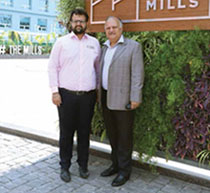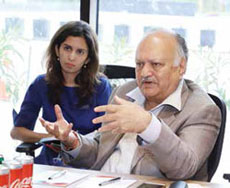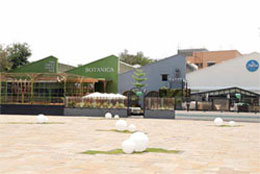Ask anyone in Maharashtra about Raja Bahadur Mills, and they will instantly recognise the name. The Raja Bahadur Motilal Poona Mills Ltd. is the first industry founded in Pune by the private sector in 1893, and for over a century, the brand has been synonymous with the city. Much like India has evolved from a developing country to one of the fastest growing economies in the world, Raja Bahadur Mills too has evolved from a textile company to an engineering company and now to its latest avatar – Raja Bahadur International, a promising new real estate player. At a recent press meet for the launch of their newest project, the Raja Bahadur City center, Corporate Citizen participated in a Q&A with Shridhar Pittie, Managing Director of Raja Bahadur International Limited (RBIL), and his son Umang Pittie, Vice President, RBIL, where they talk about their challenges, opportunities, and what it takes to be the sixth generation at the helm of an iconic enterprise

Shridhar Pittie - Raja Bahadur Motilal Poona Mills was started by my grandfather's grandfather, and he began the company in 1891. We are one of Pune's first industries, and we started our first factory after being inspired by Lokmanya Bal Gangadhar Tilak. Ours was the first textile mill in not just Pune but in the entire state of Maharashtra. There was a mill in Nagpur but at that time it was considered to be the central province and not part of Maharashtra. Pune was not ideally suited for a textile mill, as it is a very dry and hot city. The mill was started with a very nationalistic mindset, as everyone at that time wanted freedom and for India to be self-reliant as a nation. Cloth at that time used to be imported from Manchester. We wanted to give Indians an alternative. Our family was completely dedicated to the freedom movement, and the factory was our way of giving back to society. We are now a 125-year-young company. My sons Umang and Rohan have now come into the business, and they are the sixth generation to run it. This company was also one of the early members of the Bombay Stock Exchange (BSE). We have been listed on BSE for about 90 years now. Then, we were one of the very few companies to become a public ltd. We have been a big employer in Pune, and we have contributed to the development of Pune in our own manner.
In 1960, Pune was developing as an engineering center. We decided that it was a good time to venture into the engineering industry. We started making drafting machines. At that time, there was a lot of importance placed on indigenization. From pencils, pens to even planes all had to be manufactured in India. There was a lot of emphasis on self-reliance. To make any product, you have to have an industrial design first. To make these drawings, you needed drafting machines. We started making them under the brand name Pittie. In any industry all over India at that time, Pittie machines could be found. We were also very active in establishing the standards which others would follow for decades. Our standards were stricter than even DIN, the standards used in Germany at that time. I feel proud that by the time we shut down production, only we had the ISI mark. None of our competitors qualified. We used to export our machines abroad as well. In the 1960s, in Indian homes, people didn't use bedsheets, even though they are now ubiquitous. Ladies at that time used to buy large pieces of cloth, hem them on both sides and convert them into makeshift bedsheets. It was Raja Bahadur which started the concept of bed sets all over the country in the 1960s. Today, everyone knows Bombay Dyeing. In the 1960s, no one knew Bombay Dyeing. We used to export 100% of our product to Europe and Scandinavia. At one time, our exports reached 80% of our total production. We even started exporting to Japan. This was possible only due to extreme adherence to quality. We put a lot of emphasis on cleanliness. If the factory is not clean, the workers would not be motivated to work. We inculcated this habit of cleanliness from the management level down to the sweeper level. Even the junior most people play a crucial role in this.
Once Auto cad was launched, the market for drafting machines drastically reduced so we shut down production. We had a machine tool axis company in Viman Nagar, which was shut down as India looked towards China for manufacturing. We have been committed to quality since the beginning, no matter what we do. In the 1960s, after the Indo-China war, there was a nationalistic sentiment all over the country. We tied up with Armament Research Development Establishment (ARD) to make several products for Defence. We also designed the first machine tool in the country, for which we got the Silver Shield from the President of India for import substitution. We are still young, and the only thing constant is change. Today, the main focus of Raja Bahadur is in real estate.
Raja Bahadur Motilal Poona Mills was started in 1891. We are one of Pune's pioneering industries, having started our first factory, inspired by Lokmanya Bal Gangadhar Tilak

We have constructed a commercial building on Tadiwala Road and leased it to TCS. We were awarded a prize by the Builders Association for quality and speed. We are now constructing a residential project in Kharadi called Pittie Courtyard. Whatever we do, we do it with full honesty and dedication. We want to live up to the legacy of Raja Bahadur brand.
Umang Pittie - We are developing the Raja Bahadur city center and the already constructed part of the development is called 'The Mills'. This has restaurants, community spaces, co-working spaces, and a plaza at the center where you can have events and activities. Our vision is to make The Mills a buzzing community space.
We are centrally located near the Pune Railway Station, so people will find it very convenient. We have many restaurants with various cuisines to serve everyone. We have ample car parking spaces for customers. The unique aspect of The Mills is that we have revamped the facade of the existing Mills to give the location a very distinctive vibe. You won't find such a design anywhere else.
Shridhar - In the year 2000, the entire textile industry was going through turmoil. It no longer was feasible to continue in that business. So we took a step back and reevaluated our options.
Officially, we closed them down in 1997, but for all intents and purposes, it has been closed since 1993. That was the time when the company was going through a tough phase. We got back on our feet by undertaking a commercial development on Tadiwala Road.
The scale of our business was quite large. When you exit such a large business, it takes time. There are government procedures and regulations, and internally too there is a restructuring that we have to do. I feel that the process we have in our country does take too long. If India has to grow, we need reform in the decision-making process. Because that is where it takes forever, and such delays are disastrous for businessmen. Take, for example, the real estate business. Just look at the amount of time environmental clearance takes. How much time various permits take. By the time one gets granted, the other expires. What we definitely need is a huge change in the decision-making process. I also feel that if you look at the judiciary, half the cases would disappear if the ruling comes within two years. Because it takes ages, criminals themselves run towards the judiciary to stall cases. I know what pains I have gone through to revamp The Mills. As for the textile industry, you know what happened to the Bombay Mills in the '80s. Since the Datta Samant strike, the textile industry in Mumbai has been crippled.
The Raja Bahadur group has constantly evolved. What never changed is that our customers remain our focus, whether we are in textiles, engineering or real estate
Bombay Dyeing doesn't exist today in that form at all. As for why the textile mills failed, let me give you an example. If you eat at a restaurant and get a stomach ache, it could be due to any number of reasons. But if everyone in the restaurant faces the same issue, then the restaurant is definitely to blame. If one company fails, you can blame the company management, but if all the textile companies in the country fail, then it is an epidemic. Even then, we weathered the storm for a lot longer than our competitors. We were one of the last companies to still be open when the entire industry had collapsed. If we analyse why the textile industry as a whole failed, it could take months. In fact, several books have been written about it. We could not escape the epidemic that had plagued the entire industry. Empress Mills, owned by Tata group, one of India's premier business houses with excellent management, closed down its shutters before us. If even they couldn’t survive, how could other mills with far fewer resources.
In the engineering sector, we were in the business of making drafting boards. As I explained earlier, when the AutoCAD software was launched in the 1980s, the entire market shifted to software-based drafting programs, and drafting machines became obsolete. Due to this seismic change, we had to shut down that business.
Umang - The Raja Bahadur group has been constantly evolving. What has never changed is the fact that our customers remain our focus, whether we are in textiles, engineering or real estate. The Mills has restaurants, commercial offices and we plan to expand soon.

We have developed 50,000 sq. ft. for F&B and another 50,000 sq. ft. for commercial spaces. The total space we own is about 18 acres, and we have developed about 5-6 acres so far.
We have so far introduced six restaurants at the premises. Botanica is a greenhouse bar. Tathya is an Indian restaurant. The Millers is a bar. Cinco is a mix of a French patisserie and a nightclub. We have Baobab which is an American Diner, and we have 2BHK which is a club and diner. We have a good variety of restaurant to suit every taste. We are also looking to develop a gallery for artists so that our patrons can also get a cultural experience and budding artists can be provided with a platform to showcase their talent. This space can also be used to showcase other talents, as everyone needs a platform to showcase their work. We are in discussions and this space should be developed in another three months.
The Restaurants are already partly operational. Botanica, Millers, 2BHK and Tathya are already open. There is no grand launch as such.
Shridhar - You are right, we may have been a little enthusiastic (laughs). When we ventured into the industry, it was in really bad shape. When we started our residential project, it was tougher still. We as a company always look at the long term. We are industrialists, not builders. The mindset is slightly different. You can't be a company which has survived and thrived over a century without looking at the big picture. Fortunately, we had the benefit of owning our own land, rather than having to buy it on steep loans. We also have another tradition in our family, of starting in niche markets and starting from scratch. We had to dirty our hands somewhere, and the best time to dirty one's hands is during the most difficult period. It has been a very hard time but our residential project was a big success.
There was a lot of investment. I don't have the exact figures with me, but there was a lot of work from building the road to The Mills to a massive design overhaul. The investment runs into several crores. We are a publically listed company so you can find out the exact amount from the balance sheet.
Definitely. Now that we have dirtied our hands and amassed experience, we want to go further. However, we don’t want to be overoptimistic as the sector is going through a tough patch. We are definitely open to future projects as the opportunities come.
We have leased the properties, so the income will keep coming. We cannot look at it as a pure break-even point, as we own the land, without which the investment would have been very high. We are looking at it long-term. We will have to wait and watch.
By NEERAJ VARTY